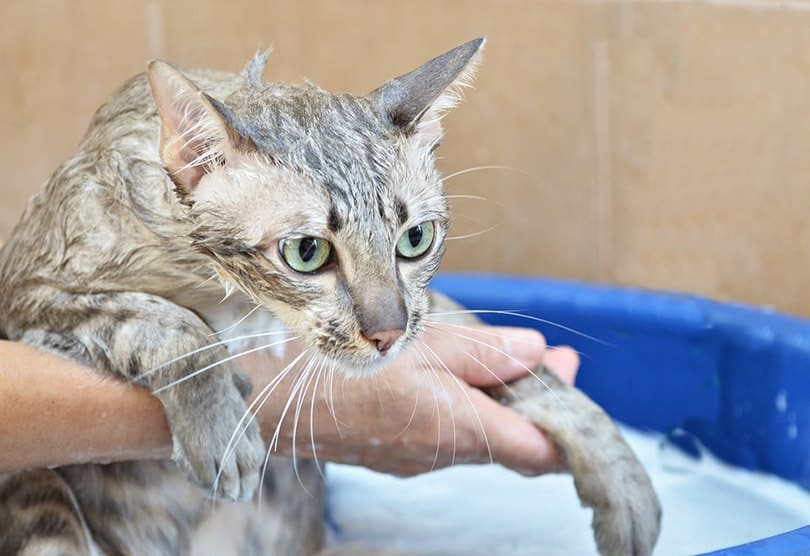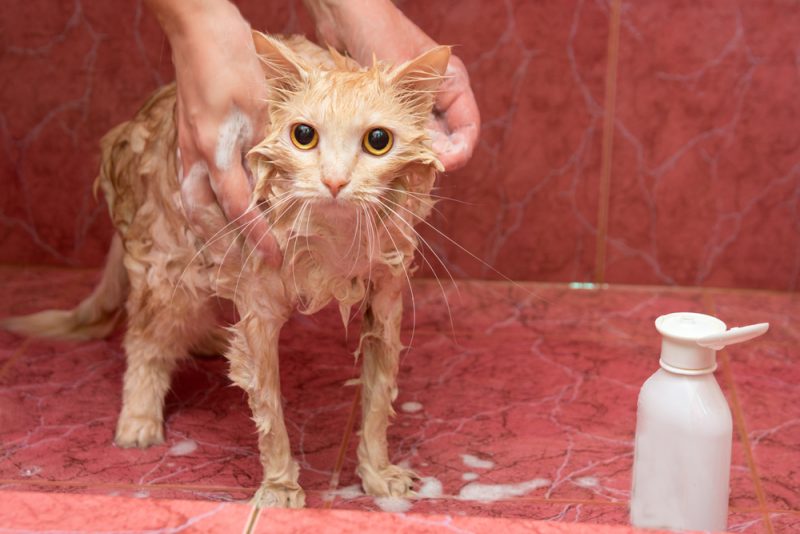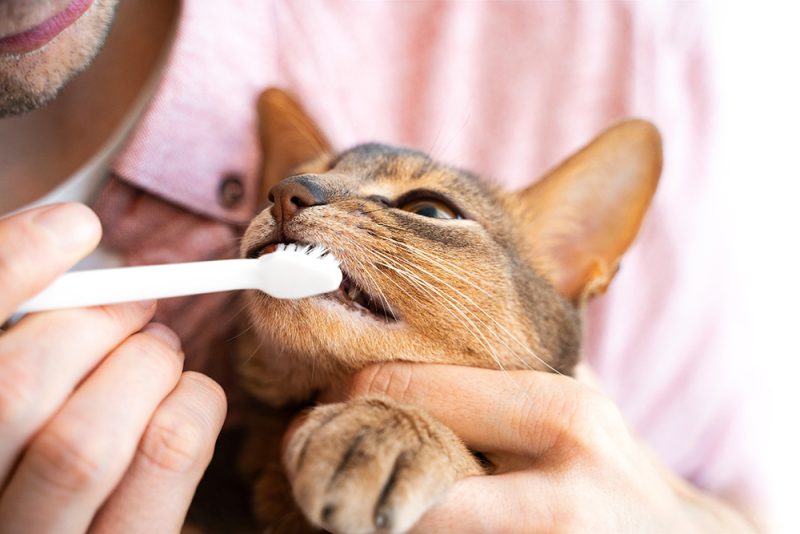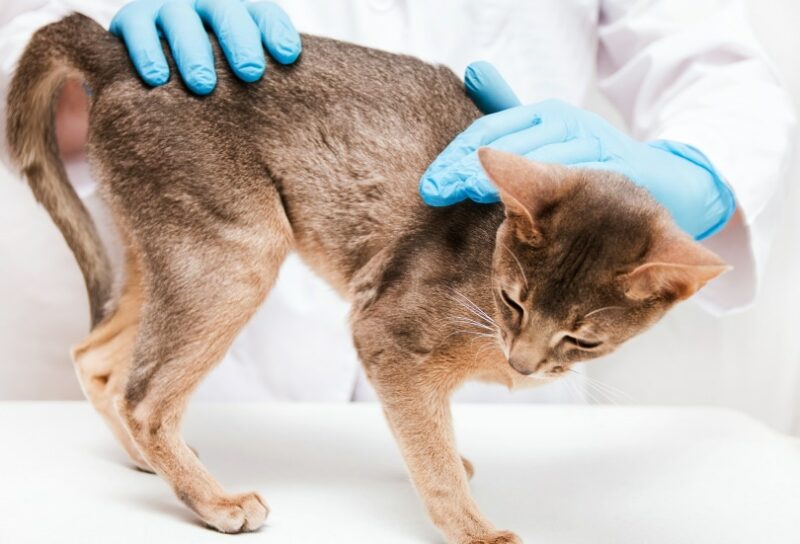In this article
Allergies are common in dogs and are one of the top reasons for veterinary visits 1. We often hear of pollens, dust mites, and certain foods causing allergies, but have you ever wondered if, like humans, it’s possible for our canine counterparts to be allergic to cats? The answer may surprise you. While it’s uncommon, it is in fact possible for dogs to be allergic to cats.

Understanding Allergies in Dogs
An allergy occurs when a dog’s natural defense system (known as the immune system) mistakenly identifies a substance as harmful. The particular substance is referred to as an allergen. Common allergens include pollens, mold spores, dust mites, flea saliva, and certain foods. While it’s uncommon, dogs can also be allergic to cats. The reverse is also possible; cats can also be allergic to dogs.
Usually, allergens are harmless and, in most dogs, do not cause a problem. However, if a dog has an allergy to a particular substance, their immune system overreacts by producing special proteins known as antibodies that attach to the allergen. This in turn, causes the release of histamine and other chemicals into the bloodstream, which leads to itching and many other allergic signs.
What Causes a Cat Allergy?
Contrary to popular belief, cat hair itself is not allergenic. The allergy is caused by a protein found in a cat’s saliva, urine, and dander 2. Dander is composed of tiny particles of skin that are shed by cats, dogs, and other animals with fur or feathers.
Cat allergens are very small, so they become airborne easily. Once in the air, they remain suspended for long periods of time, eventually settling down on carpets, blankets, furniture, and other household items. When a dog comes into contact with these allergens, they may experience an allergic reaction.

How Can I Tell If My Dog Has a Cat Allergy?
Dogs that are allergic to cats generally show signs that are similar to other environmental allergies. Allergies tend to look the same regardless of what the dog is allergic to. The most prevalent sign of allergies in dogs is itchy skin. Allergic dogs scratch, lick, and chew their skin to try relieving the itch, causing their skin to appear red and inflamed. This may lead to an overgrowth of yeast and bacteria, resulting in secondary skin infections. A dog with a skin infection may have small pus-filled bumps on their skin, or skin that appears scaly, flakey, crusty, or moist.
Some dogs that are allergic to cats may show respiratory signs such as coughing, sneezing, a runny nose, or red, watery eyes, although these signs are not as common as in people with cat allergies.
The only way to know for certain that a dog has a cat allergy is by performing intradermal skin testing or a blood test, known as a radioallergosorbent (RAST) test 3. A veterinarian will perform these tests once other non-allergic causes of a dog’s clinical signs have been ruled out, such as a skin scrape to rule out mange, or a fungal culture to rule out ringworm.
Intradermal skin testing and RAST testing help veterinarians determine which environmental allergens may be triggering a dog’s allergies, allowing them to formulate a plan to address the issue. A test for a cat dander allergy is often included in these allergy tests. These tests are also customized to include allergens specific to the climate or area that the dog lives in.

Are Cat Allergies Treatable in Dogs?
The simplest way to manage cat allergies is to minimize or eliminate a dog’s exposure to cats. This, however, isn’t always practical. Fortunately, there are other ways to manage cat allergies which don’t involve rehoming or separating your pets!
Although there is no cure for allergies, there are treatments available that can reduce the clinical signs and improve a dog’s quality of life. These include:
1. Hyposensitization Therapy
If the specific allergens that cause a dog to have an allergic response are known, then hyposensitization therapy can be given. Hyposensitization involves giving a dog a small quantity of the offending antigen (such as cat dander) as an injection or oral drops, and slowly increasing the amount over time. The aim of treatment is to decrease the sensitivity of the dog to specific allergens which in turn, decreases the itch. Hyposensitization can also decrease the need for other allergy medication.
2. Allergy Medication
Traditionally, medications, such as antihistamines and corticosteroids, have been used to treat allergies in dogs. However, newer medications such as oclacitinib (Apoquel®), and lokivetmab (Cytopoint®) are now available. These drugs block specific chemical signals associated with itching in dogs.

3. Nutrition
Certain diets are specially formulated to help reduce signs of environmental allergies in dogs. Antioxidants and other ingredients such as essential fatty acids, zinc, and vitamin A, are added to help support the skin and reduce the inflammatory response. These special diets are usually available from a veterinarian.
4. Medicated Shampoos
Medicated shampoos are specially formulated to help improve the condition of the skin and prevent allergy flare ups. Bathing your pup may also reduce the number of cat allergens found on their coat, potentially reducing the allergic response.

5. Other Strategies
Regularly vacuuming your home to reduce the amount of cat dander in the environment and having an air purifier to remove cat dander from the air can also help a dog with cat allergies.

Conclusion
While it’s rare, it is in fact possible for dogs to be allergic to cats. Fortunately, there are several treatments available to help manage allergies, so even if your dog is allergic to cats, your canine and feline friends can continue to live together in harmony!
If your dog is showing signs of an allergy, it’s best to book an appointment with your veterinarian as allergies can have a negative impact on the quality of life of our canine companions. Your veterinarian can make an accurate diagnosis and help formulate a treatment plan to help your dog.
Featured Image Credit: StockSnap, Pixabay


















